The albums that Bill Withers made from the mid-Seventies onward found the singer/songwriter attempting, sometimes uncomfortably, to fall in line with black music trends of the time. It’s probably easy to blame this on Columbia Records, who bought Bill’s contract (as well as the rights to his earlier albums) out from his original label, Sussex. The issues with Sussex likely set in motion Withers’ long-standing distrust of the music industry.
Unfortunately, that distrust also eventually led to Withers’ retirement from the music industry. Label troubles led to Withers not releasing any new music for the first half of the ’80s. However, he stumbled into one of the most successful songs of his career when “Just The Two of Us,” a song he co-wrote and sang on (featured on sax player Grover Washington Jr.’s Winelight LP) made it to the top five of the pop charts in 1981. His last album was released in 1985, and judging from the documentary Still Bill, he’s settled into a life of regular guy-dom in the years since.
I still hold out hope that there’s a new album (or more) left in him, though. I’d break my piggy bank to see him live. In the meantime, here’s Part 2 of our Note for Note series dedicated to Mr. Withers.
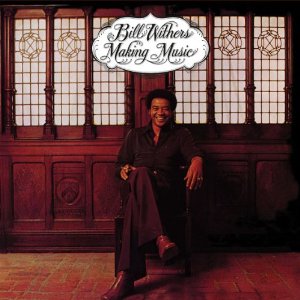 Making Music (1975): The front cover of Making Music finds a smiling Withers seated comfortably in an easy chair. The back cover finds him surrounded by friends and family. These were obvious signals that this album would move away from the angst that provided much of the content for Bill’s previous album, ‘Justments. Certainly, Making Music is a lighter album than its predecessor. It was the first album Bill recorded after his divorce from actress Denise Nicholas, and it was also the first album Bill recorded for his new label, Columbia Records. While his business struggles with previous label Sussex are not directly addressed in the album’s lyrics, you can definitely pinpoint at least one post-divorce song (the unexpectedly buoyant “I Wish You Well”) and one awkwardly-reconnecting-with-lost-loves song (the wistful “Hello Like Before.”)
Making Music (1975): The front cover of Making Music finds a smiling Withers seated comfortably in an easy chair. The back cover finds him surrounded by friends and family. These were obvious signals that this album would move away from the angst that provided much of the content for Bill’s previous album, ‘Justments. Certainly, Making Music is a lighter album than its predecessor. It was the first album Bill recorded after his divorce from actress Denise Nicholas, and it was also the first album Bill recorded for his new label, Columbia Records. While his business struggles with previous label Sussex are not directly addressed in the album’s lyrics, you can definitely pinpoint at least one post-divorce song (the unexpectedly buoyant “I Wish You Well”) and one awkwardly-reconnecting-with-lost-loves song (the wistful “Hello Like Before.”)
Two of the album’s best tracks-“Paint Your Pretty Picture” and “Sometimes a Song”-find Bill writing (and singing) about writing and singing songs. While many paint Bill’s Columbia tenure as a time in which his material wasn’t as potent as it had been for Sussex, Making Music is a very solid affair. If anything, the differences between this album and his previous work are cosmetic. The production is certainly much more luxurious-not unlike Phil Spector’s after taking the reins of Let It Be by The Beatles. Strings are much more prominent, and female background vocals also move to center stage. There’s even some adventurous pseudo-classical stylings on “Don’t You Want To Stay?” However, Bill remains an arresting lyricist and vocalist, and although his music may not have been as raw and stark, it was no less moving because of it.
Grade: B+
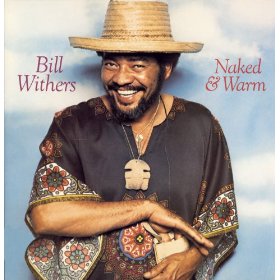 Naked & Warm (1976) : I’m not sure what happened between the recording and release of Making Music and the recording and release of Naked & Warm, but whatever happened, the end result was the worst album of Withers’ career thus far. A comment in the liner notes indicates that Bill had been on the verge of quitting the industry, and considering the quality of the album, it sounds like there may have been some “push” on the record company end to get him to complete this project. For a large part of the album, his songwriting facilities escaped him, his intensity escaped him, and for the first time, there are several songs on which he sounds like he doesn’t even care, as though he’s under a serious pot haze (and who knows? There was a lot of shit floating around L.A. in the late Seventies.) Maybe that’s what the impetus was behind the 10 minute-long “City of Angels.”
Naked & Warm (1976) : I’m not sure what happened between the recording and release of Making Music and the recording and release of Naked & Warm, but whatever happened, the end result was the worst album of Withers’ career thus far. A comment in the liner notes indicates that Bill had been on the verge of quitting the industry, and considering the quality of the album, it sounds like there may have been some “push” on the record company end to get him to complete this project. For a large part of the album, his songwriting facilities escaped him, his intensity escaped him, and for the first time, there are several songs on which he sounds like he doesn’t even care, as though he’s under a serious pot haze (and who knows? There was a lot of shit floating around L.A. in the late Seventies.) Maybe that’s what the impetus was behind the 10 minute-long “City of Angels.”
It’s a hard crash down to Earth after five albums of fairly excellent material. Many songs (including the title track feel like extended jams more than they do songs,with repetitive and threadbare lyrics. That said, the band Withers assembled for this album is pretty tight. They help make the album somewhat enjoyable despite the lack of lyrical acuity that Withers was best known for. The tender “My Imagination” is easily the best of the album’s 8 songs. Of course, it was the single.
Grade: C
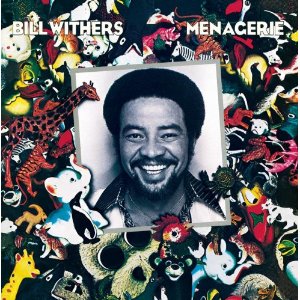 Menagerie (1977): Menagerie brought Bill Withers back to the charts in a big way. It was his second Gold album, and “Lovely Day” became his biggest hit in half a decade. Withers jettisoned many of the musicians he’d previously recorded with and constructed Menagerie with the help of some of L.A.’s hottest musicians-including Crusaders percussionist Ralph MacDonald, plus bassist/Five Stairsteps member Keni Burke and Jerry Knight & Ray Parker Jr., who were just about to hit big with Raydio. Menagerie was certainly a decision (whether on Withers’ part or his label’s) to make a more contemporary, commercial product. They certainly succeeded in that mission.
Menagerie (1977): Menagerie brought Bill Withers back to the charts in a big way. It was his second Gold album, and “Lovely Day” became his biggest hit in half a decade. Withers jettisoned many of the musicians he’d previously recorded with and constructed Menagerie with the help of some of L.A.’s hottest musicians-including Crusaders percussionist Ralph MacDonald, plus bassist/Five Stairsteps member Keni Burke and Jerry Knight & Ray Parker Jr., who were just about to hit big with Raydio. Menagerie was certainly a decision (whether on Withers’ part or his label’s) to make a more contemporary, commercial product. They certainly succeeded in that mission.
Disco was all the rage in 1978, and Menagerie certainly recognizes that with songs like “Lovely Night for Dancing” and “She Wants To (Get On Down)” Bill sounds ill-at-ease trying to fit his sound into this trend. The album just comes across sounding a bit awkward. “Lovely Day” is easily the album’s best track (and would go on to become, after “Ain’t No Sunshine” and “Lean On Me,” arguably Withers’ best known song.)
Grade: B-
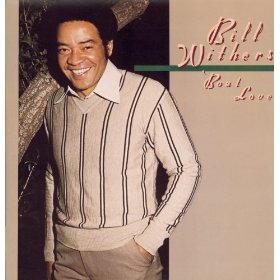 ‘Bout Love (1978): When Bill Withers calls an album “’Bout Love,” believe it when he tells you it’s about love. Four of the eight song titles mention the word “love,” and the back cover notably contains a photo of his wife Marcia and son Todd. It’s obvious that the album comes from a good place. Unfortunately, the songs don’t hold up. Withers repeats some of the mistakes he made on Making Music, only with different musicians giving the ponderous songs more of a pop sheen than a funk one. “You Got the Stuff” is a prime offender-when you’re listening to a supreme wordsmith like Bill Withers, you want to hear more than the title line repeated over and over, backed by an efficient but not particularly engaging band. The disco card on Bout Love is underplayed in favor of a more jazz/R&B fusion style, but the songs are just as anonymous, with the exception being “Memories Are That Way,” a return to the Bill Withers of old.
‘Bout Love (1978): When Bill Withers calls an album “’Bout Love,” believe it when he tells you it’s about love. Four of the eight song titles mention the word “love,” and the back cover notably contains a photo of his wife Marcia and son Todd. It’s obvious that the album comes from a good place. Unfortunately, the songs don’t hold up. Withers repeats some of the mistakes he made on Making Music, only with different musicians giving the ponderous songs more of a pop sheen than a funk one. “You Got the Stuff” is a prime offender-when you’re listening to a supreme wordsmith like Bill Withers, you want to hear more than the title line repeated over and over, backed by an efficient but not particularly engaging band. The disco card on Bout Love is underplayed in favor of a more jazz/R&B fusion style, but the songs are just as anonymous, with the exception being “Memories Are That Way,” a return to the Bill Withers of old.
Grade: C
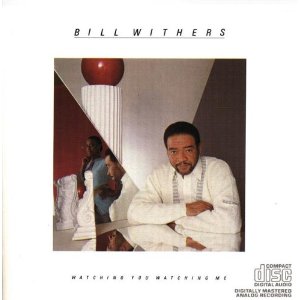 Watching You Watching Me (1985): Bill wasn’t silent during the first part of the ’80s, although he released no new albums between 1978-1985. His “Just the Two of Us” became a huge smash for saxophone player Grover Washington Jr., and he contributed to other projects as well. However, 1985’s Watching You Watching Me was the first-and only-Withers LP of the decade, and songs like “You Can’t Smile It Away” and “You Try To Find a Love” prove that Bill had not lost his songwriting acuity. No, they’re not up to the same level as his classics, but they’re certainly better written than most of the pop ballads that were hitting the charts in the mid Eighties.
Watching You Watching Me (1985): Bill wasn’t silent during the first part of the ’80s, although he released no new albums between 1978-1985. His “Just the Two of Us” became a huge smash for saxophone player Grover Washington Jr., and he contributed to other projects as well. However, 1985’s Watching You Watching Me was the first-and only-Withers LP of the decade, and songs like “You Can’t Smile It Away” and “You Try To Find a Love” prove that Bill had not lost his songwriting acuity. No, they’re not up to the same level as his classics, but they’re certainly better written than most of the pop ballads that were hitting the charts in the mid Eighties.
Speaking of which, Watching You makes me wonder if Withers wasn’t coaxed out of semi-retirement by the success of Lionel Richie, because the production here is definitely reminiscent of Can’t Slow Down, Lionel’s magnum opus. Synths galore (mostly played by Bill) reign supreme here, and although they give the album a sound that immediately marks the time period they came from, they’re not unenjoyable in the context of this project. A who’s who of session pros appears here from David Foster to Greg Phillinganes to the ubiquitous Paulinho Da Costa, and if you’re familiar with the work these gentlemen have done, you have a pretty good idea of what this album sounds like. It’s a step above the previous couple of albums, but still not totally satisfying. Of course, it’s appreciated more knowing that it might be the last album Withers ever releases.
Grade: B-
As far as compilations go, Lean On Me: The Best of Bill Withers is a pretty good single-disc (18 tracks) distillation of Bill’s best work. None of the hits are missing, but if you’re like me, you’ll probably want to explore more. As mentioned before, all 9 of the albums reviewed here are available on The Complete Sussex & Columbia Albums, a box set recently issued by Legacy Recordings.
Also, make sure you check out the excellent documentary Still Bill.
